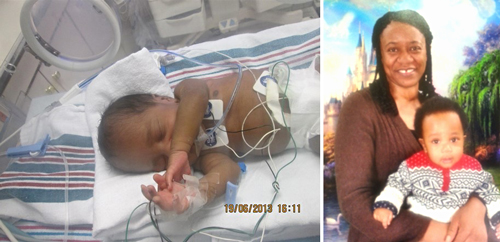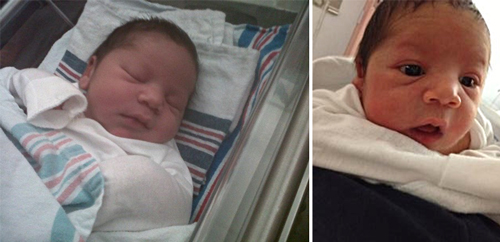Corina’s Story
By Corina Quow
 As a woman who had just entered my forties, with uterine fibroids, you can imagine both the surprise AND joy experienced when I found out I was pregnant with my first child. Despite being instructed to make regular visits to the hospital’s clinic, I hesitated; I was scared of hearing any bad news and intimidated by the hospital.
As a woman who had just entered my forties, with uterine fibroids, you can imagine both the surprise AND joy experienced when I found out I was pregnant with my first child. Despite being instructed to make regular visits to the hospital’s clinic, I hesitated; I was scared of hearing any bad news and intimidated by the hospital.
In my second trimester, I started noticing some changes – in addition to the regular discomforts that came along with my pregnancy; I felt pressure and noticed that my heart was racing. Then, while at work, my water broke. I was 26 weeks pregnant.
In order to best protect my baby, and myself, I was told that I would have to be admitted and remain in the hospital for the remainder of my pregnancy. Dr. Gaither did everything in her power to make my extended stay at Brookdale as enjoyable and comfortable as possible. I looked forward to her visits every Thursday morning, and when the weather turned warmer, for our lunches outside in the hospital’s courtyard. I felt honored that she would take the time out of her busy day to visit with me and make me feel special.
At 34 weeks, I gave birth to my son, Francis. It was Dr. Gaither’s decision to admit me at 26 weeks that saved my son’s life. Dr. Gaither has been an inspiration and to this day, is still a big part of my life.
About Uterine Fibroids
- African-American women are three to five times at greater risk than white women
- Women who are overweight or obese for their height (based on body mass index or BMI) are at slightly higher risk
- Women who have given birth appear to be at lower risk
- Many women don’t feel any symptoms with uterine fibroids. But fibroids can cause the following:
- Heavy or painful periods
- Bleeding between periods
- Feeling “full” in the lower abdomen – sometimes called “pelvic pressure”
- Urinating often (from a fibroid pressing on the bladder)
- Pain during sex
- Lower back pain
- Reproductive problems, such as infertility, multiple miscarriages and early onset of labor during pregnancy
Annette’s Story
By Annette Natal
 When I first became pregnant with my son, my primary obstetrician referred me to Dr. Gaither at Brookdale University Hospital as my medical history called for the care of a specialist so that the health of my child and me be closely monitored and maintained.
When I first became pregnant with my son, my primary obstetrician referred me to Dr. Gaither at Brookdale University Hospital as my medical history called for the care of a specialist so that the health of my child and me be closely monitored and maintained.
Despite being located near my home, I had never been treated at Brookdale and while I understood it was for my best, I wasn’t looking forward to seeing a new doctor. Medically, I felt as if the odds were stacked against me – I had experienced multiple miscarriages, I have numerous medical conditions, most prevalent being lupus, and I was entering my forties. I couldn’t help but feel hopeless and that it would only be a matter of time that I once again miscarried with this child.
From day one, Dr. Gaither did everything in her power to make me feel comfortable and special. She reached out to my rheumatologist to better understand my history with lupus, got me on a proper course for managing my flare-ups and made sure I was being seen by the right doctors – going as far as helping me navigate Medicare so that I could receive proper testing and necessary treatments – throughout my pregnancy.
As my due date drew near, I learned that it would be necessary for me to deliver via C-section, another first for me, as my son was large and remained transverse throughout my pregnancy. Dr. Gaither eased my worries – I had grown to trust her and knew it was the best decision and that she would be with me all the way.
Dr. Gaither taught me to keep hope alive and on December 17, 2012, Jared Kaleb Amir was born.
Today, I have a beautiful son who lights up the lives of his five older sisters and so many others. When I am at my worst and experiencing some of the challenges regularly faced with lupus, I think of the gift that is Jared – a gift that I feel I may not have been given if it was not for the exceptional care of Dr. Gaither. I joke that Dr. Gaither and her team would make me feel like J. Lo anytime I walked into their offices. When it comes to doctors – and I have grown to know quite a few in the management of my medical conditions – she is in a league of her own, a true rock star.
About Lupus & Pregnancy
Under normal function, the immune system makes proteins called antibodies in order to protect and fight against antigens such as viruses and bacteria. Lupus makes the immune system unable to differentiate between antigens and healthy tissue. This leads the immune system to direct antibodies against the healthy tissue – not just antigens – causing swelling, pain, and tissue damage.
Other risk factors include exposure to sunlight, certain prescription medications, infection with Epstein-Barr virus, and exposure to certain chemicals.
Since lupus is known to occur within families, doctors believe that it is possible to inherit a genetic predisposition to lupus. There are no known genes, however, that directly cause the illness. It is probable that having an inherited predisposition for lupus makes the disease more likely only after coming into contact with some environmental trigger.
The higher number of lupus cases in females than in males may indicate that certain hormones can trigger the disease. Physicians believe that hormones such as estrogen regulate the progression of the disease because symptoms tend to flare before menstrual periods and/or during pregnancy.
There are necessary tests your doctor will request once you become pregnant including urinalysis to check for protein in your urine, blood chemistry tests to look at kidney and liver function, antiphospholipid antibodies to check for risk of miscarriage and anti-SSA/Ro and anti-SSB/La antibodies to see if the fetus has a risk of neonatal lupus.
You will need to do your part as well – maintaining visits with your rheumatologist, following your maternal-fetal specialist’s instructions on rest, exercise, diet and medications, listening to your body and making the right lifestyle choices.
Jennifer’s Story
By Jennifer Pierre
 As a diabetic, none of my four pregnancies had been easy, but my pregnancy with Alexis, who we lovingly call Lexi, was the most difficult to date. The fact that I was older, coupled with my diabetes, made it especially challenging.
As a diabetic, none of my four pregnancies had been easy, but my pregnancy with Alexis, who we lovingly call Lexi, was the most difficult to date. The fact that I was older, coupled with my diabetes, made it especially challenging.
I started seeing Dr. Gaither at the beginning of my pregnancy; from the first time we had met, I knew I was in good hands and many of my worries were put at ease. This pregnancy was so hard and I often felt like I didn’t know what to do, but Dr. Gaither took the time to sit with me, talk through my concerns and create a pregnancy plan that made sense to me and was easy to follow.
Dr. Gaither worked with the nutritionists at Brookdale to develop a diet plan that I could stick to and that would help keep my diabetes in check throughout my pregnancy. As my due date drew near, I started seeing Dr. Gaither on a frequent basis, at which point it was determined that a C-section would be the best way to deliver. While it was my first time delivering via C-section, Dr. Gaither eased any of my worries, explaining to me what to expect and ensuring me that this was what was best for the health of Lexi and me.
On February 28, 2012, we welcomed Lexi into the world. To this day, Dr. Gaither checks up on us and is always there for me and my family should we need her. When experiencing a difficult pregnancy – you don’t need a doctor who treats you as if you are just another patient who walks through his or her door and only uses medical terms – you need someone like Dr. Gaither, who when even in your most restless state, assures you and makes you feel as if you are her #1 priority.
